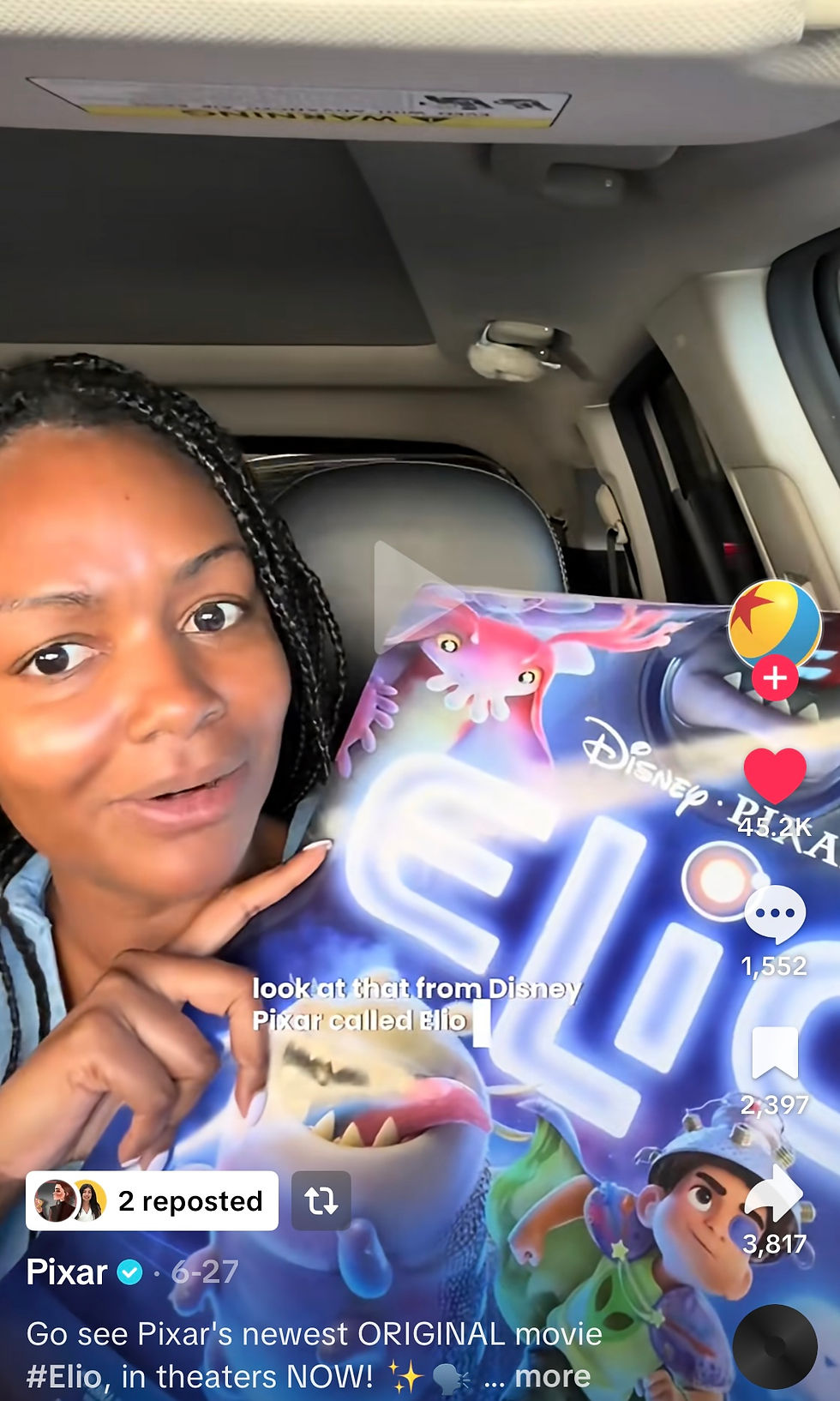Marketing Movies: What Elio & K-Pop Demon Hunters Can Teach Us About Authenticity, Timing, and Audience Understanding
- Ashley Edwards

- Jul 28, 2025
- 4 min read
Updated: Aug 4, 2025
This summer, two animated films hit very different notes in the entertainment and marketing world: Elio from Disney/Pixar and K-Pop Demon Hunters from Netflix/Sony Animation.
Both were original stories. Both targeted Gen Z and family audiences. But one flopped, and the other is breaking streaming records, topping music charts, and earning global praise.
So… what went wrong? And what went so right? Let’s break it down. 👇
Elio: An Original Story With a Disconnected Launch
Let’s set aside the controversy around Elio’s pre-production changes, including the scrapping of its original story, original director, and the removal of LGBTQIA+ themes for "market palatability." That decision likely impacted creative energy, but the marketing is where this really unraveled.
The Problem Wasn’t "No Marketing"
It was misplaced marketing. Pixar did have a marketing plan for Elio, it just didn’t align with its audience.
The rollout felt delayed. TV spots and Instagram ads trickled out late, a TikTok campaign launched but struggled to gain traction, and a Happy Meal promo, while nostalgic, felt oddly disconnected from the film’s core identity.
And then… came the TikTok. You may have seen it: Pixar’s official account leaned into a trend, but instead of a wink or a nod, it delivered a guilt trip, calling out audiences for “asking for original stories and then not showing up.”

I had to double-take. It wasn’t cheeky. It wasn’t clever. It was tone-deaf.
Guilt is not a strategy. Especially not when you’re asking Gen Z (or any audience) to spend $50+ on a movie night during a recession. And yes, with a $17 ticket and $30 for snacks and drinks, it is a $50 endeavor.
If you’re marketing originality, the strategy has to be just as bold, and just as emotionally in tune as the story you’re asking people to invest in.
The Missed Mark: Know Your Real Audience
Disney seemed to aim at parents with kids, the people holding the wallets. But, where was the content that got kids excited? Or Gen Z, the fan-driving, trend-creating, word-of-mouth-amplifying generation? You can’t market to everyone. You need to market for someone, and you definitely can’t scold an audience into supporting your work.
K-Pop Demon Hunters: A Masterclass in Niche Marketing
Let’s talk about Netflix’s newest animated gem: K-Pop Demon Hunters. No traditional theatrical run. Minimal mainstream hype. Yet somehow, a full-blown global moment. This is what happens when niche marketing meets cultural authenticity and creative freedom.
Why Did it Work?
In an economy where audiences are picky about where their money goes, accessibility matters. K-Pop Demon Hunters was right there on Netflix: no extra decisions, no added cost, no barrier to entry. That simplicity lowers the psychological threshold of commitment. For a generation overwhelmed by choice and cautious about spending, the message was clear: just press play.
The title alone, K-Pop Demon Hunters, practically markets itself. It’s a genre mashup that feels chaotic in the best way: part K-pop fantasy, part anime action, part supernatural teen drama. This combo tapped directly into Gen Z and younger millennial interests. The internet had to know what this was. The memes and reactions started before the movie even dropped. Curiosity is one of the most powerful tools in marketing, and this title nailed it.
This wasn’t some watered-down, westernized take on K-pop. It was fully rooted in Korean culture and sensibility, from its bold visual style to its storytelling rhythms. The fictional bands, character designs, and original songs felt like they belonged in the real K-pop ecosystem. You could feel the love, not just for animation, but for the genre, the music, and the fans. The result? A film that felt like it was made with the audience, not at them. This is what happens when creators are trusted to lead with authenticity.
The numbers tell the story:
4 weeks as Netflix’s #1 most-watched film
Poised to become Netflix’s most-viewed movie
Fictional group Huntr/x’s Golden hit #1 on Billboard Global (Excl. US)
The Saja Boys’ tracks cracked the global top 10 on both Spotify and Billboard
Golden even dethroned BLACKPINK as the highest-charting K-pop girl group track, and it's not even real girl group!
Let that sink in: fictional bands are now charting in real life. This is more than marketing a great product, it’s a reminder that when you speak directly to your audience’s passions with heart, humor, and high-quality storytelling, they’ll show up, and bring the world of the internet with them.
Key Takeaways (That Apply to Any Brand or Storyteller)
Marketing is more than media buys, it’s about connection. Don’t just throw money at ads. Understand what your audience wants to feel, not just what you want them to buy.
Authenticity wins every time. When people can feel the love, care, and cultural nuance in your product, they show up for it.
Timing matters. Build momentum early. Give people time to discover, get curious, and plan their engagement. You can't drop a campaign 10 days before release and expect impact.
You can’t market to “everyone.” Pick your primary audience, then go all in on speaking their language.
If the goal is money (and let’s be honest, it always is), the question isn’t whether original stories are profitable. They are.
The real question is: Will you trust your audience enough to make something that speaks to them, with them, and for them?
K-Pop Demon Hunters proves that people want new stories. Stories that spark joy, pride, nostalgia, curiosity. Stories that are built with love, not just revenue projections.
And fans? We can tell the difference a mile away.
Credits:



Comments